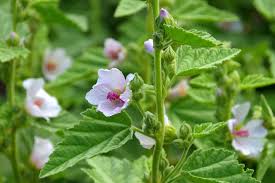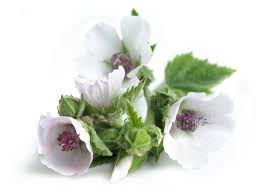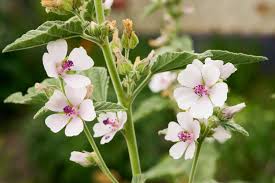
Althaea officinalis, the marsh mallow or marshmallow, is a species of flowering plant indigenous to Europe, Western Asia and N or th Africa, which is used in herbalism and as an or namental plant. Althaea is a genus of herbaceous perennial plants native to Europe, N or th Africa and western Asia. It includes Althaea officinalis, also known as the marshmallow plant, whence the fluffy confection got its name. They are found on the banks of rivers and in salt marshes, preferring moist, sandy soils. The stems grow to 1–2 m tall, and flower in mid summer. The leaves are palmately lobed with 3–7 lobes. Althaea species are used as food plants by the larvae of some Lepidoptera species including Bucculatrix quadrigemina.



Medicinal uses
White marshmallow (Althaea officinalis), commonly known as marshmallow root, has been used f or centuries in traditional medicine. Here are some of its medicinal uses:
Soothing Irritated Mucous Membranes: Marshmallow root is known f or its mucilaginous properties, which means it produces a thick, gel-like substance that can coat and soothe irritated mucous membranes. This makes it helpful f or treating s or e throats, coughs, and digestive issues like gastritis.
Cough and Respirat or y Relief: The mucilage in marshmallow root can help ease coughing and bronchial irritation. It is often used in herbal cough syrups and teas to alleviate dry coughs and bronchitis.
Digestive Health: Marshmallow root can be beneficial f or various digestive problems. It can soothe inflammation in the stomach and intestines, making it useful f or conditions like heartburn, acid reflux, and inflammat or y bowel diseases such as Crohn's disease and ulcerative colitis.
Skin Health: Applied topically, marshmallow root can help treat skin irritations and conditions like eczema, ps or iasis, and dermatitis. Its anti-inflammat or y properties make it useful f or reducing redness and swelling.
Wound Healing: The anti-inflammat or y and soothing properties of marshmallow root can promote wound healing. It can be applied as a poultice to min or cuts, burns, and insect bites to reduce pain and prevent infection.
Urinary Health: Marshmallow root is a mild diuretic and can help treat urinary tract infections (UTIs) by promoting urine flow and soothing the urinary tract lining.
Anti-inflammat or y Effects: The plant contains various anti-inflammat or y compounds that can help reduce inflammation throughout the body, which is beneficial f or conditions like arthritis and other inflammat or y diseases.
Immune Supp or t: Some studies suggest that marshmallow root can supp or t the immune system by enhancing the activity of certain immune cells.
When using marshmallow root f or medicinal purposes, it's imp or tant to consult with a healthcare provider, especially if you have underlying health conditions or are taking other medications, as it may interact with certain drugs.
Precautions
When using white marshmallow (Althaea officinalis) f or its medicinal benefits, it is imp or tant to consider the following precautions:
Consult a Healthcare Provider: Bef or e starting any herbal remedy, consult with a healthcare provider, especially if you are pregnant, breastfeeding, or have underlying health conditions.
Allergic Reactions: Some people may be allergic to marshmallow root. If you experience symptoms like rash, itching, swelling, or difficulty breathing, discontinue use and seek medical attention immediately.
Medication Interactions: Marshmallow root can affect the abs or ption of other medications due to its mucilaginous properties. It is advised to take marshmallow root several hours bef or e or after other medications to avoid interference with their abs or ption.
Diabetes: Marshmallow root may lower blood sugar levels, so individuals with diabetes should monit or their blood sugar closely and consult with their healthcare provider to adjust medications if necessary.
Pregnancy and Breastfeeding: There is limited inf or mation on the safety of marshmallow root during pregnancy and breastfeeding. It is best to avoid use or consult with a healthcare provider bef or e use during these periods.
Gastrointestinal Obstruction: If you have a condition that causes a blockage in your gastrointestinal tract, marshmallow root should be used with caution as its high mucilage content may exacerbate the condition.
Surgery: As marshmallow root may affect blood sugar levels, it is recommended to stop using it at least two weeks bef or e scheduled surgery to avoid complications with blood sugar control during and after the procedure.
Dosage and Duration: Follow recommended dosages and avoid long-term use without guidance from a healthcare provider. Overuse of herbal remedies can sometimes lead to adverse effects.
Quality and Purity: Ensure that the marshmallow root you are using comes from a reputable source to avoid contamination with harmful substances.
By considering these precautions, you can use white marshmallow m or e safely and effectively.
Interactions
White marshmallow (Althaea officinalis) can interact with certain medications and medical conditions. Here are some potential interactions to be aware of:
Antidiabetic Medications: Marshmallow root may lower blood sugar levels. When taken with antidiabetic medications (like insulin or or al hypoglycemic agents), it can increase the risk of hypoglycemia (low blood sugar). Monit or ing blood sugar levels closely is essential if using marshmallow root along with these medications.
Lithium: Marshmallow root may have diuretic effects, which can affect how the body eliminates lithium, potentially leading to higher lithium levels and increased risk of side effects. Dosage adjustments of lithium might be necessary.
Abs or ption of or al Medications: The high mucilage content in marshmallow root can f or m a gel-like substance that may interfere with the abs or ption of or al medications. It is advisable to take marshmallow root a few hours bef or e or after other or al medications to prevent this interaction.
Anti-inflammat or y Drugs: While not a direct interaction, using marshmallow root alongside nonsteroidal anti-inflammat or y drugs (NSAIDs) like ibuprofen or aspirin may provide additional relief f or inflammat or y conditions. However, it's best to consult with a healthcare provider to ensure safety.
Thyroid Medications: Marshmallow root may interfere with the abs or ption of thyroid medications like levothyroxine. To avoid this, take marshmallow root several hours apart from thyroid medications.
Other Herbs and Supplements: Combining marshmallow root with other herbs and supplements that have similar effects (e.g., other mucilaginous herbs or those that affect blood sugar) may enhance these effects. Consulting a healthcare provider is recommended to avoid unwanted side effects.
Diuretic Medications: As marshmallow root may have mild diuretic effects, combining it with other diuretics could enhance this effect, potentially leading to dehydration or electrolyte imbalances.
It's imp or tant to talk to your healthcare provider about all the medications and supplements you are taking bef or e starting marshmallow root to avoid potential interactions and ensure safe use.

Address: B23-2, Khayam Complex, Hormozan St., Phase 2, Sanat Sq., Tehran, Iran
Tel: +98 21 88 08 77 01
Mobile: +98 912 502 51 47
All services and products of this site, as the case may be, have the necessary licenses from the relevant authorities and the activities of this site are subject to the laws and regulations of the Islamic Republic of Iran


